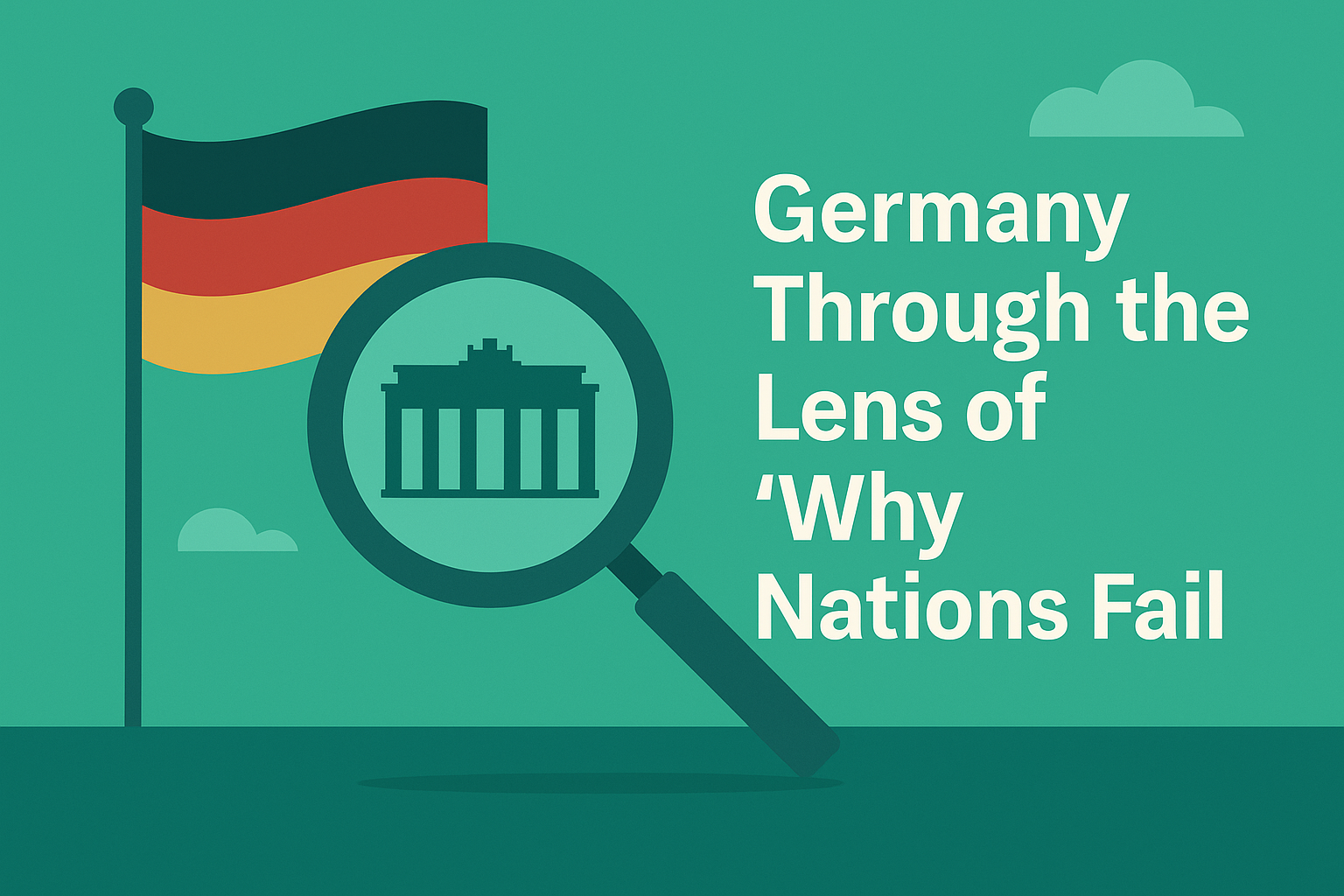Explore Germany’s political and economic systems through Daron Acemoglu’s theory of inclusive and extractive institutions. This analysis highlights key challenges such as inequality, immigration, and elite influence.
Introduction
In his book Why Nations Fail, Professor Daron Acemoglu emphasizes the role of institutions in determining the success or failure of nations. According to his theory, nations that thrive possess “inclusive institutions” that provide broad access to economic and political opportunities, while those that fail are marked by “extractive institutions” that concentrate power and wealth in the hands of a few. In this article, we will analyze Germany’s current economic and political systems through the lens of Acemoglu’s theory, examining both the strengths and challenges it faces.
The Strength of Inclusive Institutions in Germany
Germany exhibits many characteristics of “inclusive institutions,” which have contributed to its stability, economic prosperity, and social cohesion. Key features such as a robust welfare system, a strong labor market, and an equitable education system characterize its inclusive framework.
- Labor Market and Social Welfare: Germany’s labor market is highly regulated, ensuring worker rights and providing a comprehensive safety net through social security, unemployment benefits, and healthcare. This inclusive economic system helps maintain stability by allowing citizens to fully participate in the economy without fear of falling into poverty.
- Education and Vocational Training: Germany’s education system is considered one of the most equitable in the world, providing quality education to all citizens. The country’s “dual system” of vocational education and apprenticeships also ensures a seamless transition from education to the labor market, promoting economic productivity and reducing youth unemployment.
- Economic Stability and Competitiveness: Germany’s strong industrial sector, particularly its automotive and manufacturing industries, is a testament to its inclusive economic institutions. These industries are supported by policies that foster innovation, labor rights, and infrastructure development, making Germany one of the world’s leading economies.
Signs of Extractive Institutions and Emerging Challenges
While Germany has many inclusive institutions, it is also facing signs of “extractive institutions” that threaten its long-term stability. Economic inequality, social exclusion, and regional disparities are some of the challenges that are undermining the inclusive nature of its system.
- Immigration and Social Integration: Germany has accepted a significant number of immigrants, especially during the Syrian refugee crisis. However, integrating these newcomers into the labor market and society has proven difficult. Immigrants who struggle to integrate can face economic exclusion, leading to political and social tensions. According to Acemoglu’s theory, when a significant portion of the population feels excluded from economic and political opportunities, it can create instability and hinder national development.
- Economic Inequality and Regional Disparities: Germany’s economic disparity between the former East and West regions is still evident, with the East lagging behind in terms of income, employment, and overall economic growth. This divide contributes to social exclusion and exacerbates inequality, particularly in rural areas where opportunities are limited.
The Role of Elites and Their Influence
Acemoglu highlights that when political and economic elites prioritize their own interests over the common good, the nation is at risk of developing extractive institutions. In Germany, although there is a strong rule of law and democratic institutions, the influence of certain industries and corporations has the potential to undermine inclusivity.
- Corporate and Political Influence: Large corporations, especially in the automotive and energy sectors, have significant influence on German policies. This influence can skew decision-making in favor of these industries, sometimes at the expense of broader societal interests. For example, policies that favor large businesses or weaken environmental regulations may benefit the elites but can hinder sustainable development and fairness in the market.
- Regulatory Capture and Lobbying: Germany’s political system, like many Western democracies, is susceptible to lobbying and the influence of powerful industries. When this influence becomes too concentrated, it can lead to policies that favor a narrow segment of society, preventing the development of more inclusive institutions.
Political Exclusion and Social Unrest
Germany has largely been politically stable, but rising inequality and the challenges of integrating immigrants may lead to political fragmentation and social unrest. The rise of far-right parties in response to immigration and the perceived loss of national identity is one example of how political exclusion can manifest in a stable democracy.
- Inequality and Social Unrest: Economic inequality and social exclusion in certain regions, particularly in the former East Germany, are fueling dissatisfaction among citizens. Movements and parties that capitalize on these frustrations, such as the rise of populist groups, point to the potential for political instability if the issue is not addressed. Acemoglu’s theory suggests that long-term exclusion leads to a weakening of national cohesion and democratic stability.
Institutional Reform for Sustainable Growth
To ensure sustainable economic growth and social stability, Germany must strengthen its inclusive institutions. This involves addressing the emerging issues of economic inequality, social exclusion, and the influence of elites on political decision-making.
- Economic and Social Reforms: Tackling economic inequality by improving wealth distribution, providing better access to education and healthcare, and addressing regional disparities can help create a more inclusive society. Additionally, ensuring that immigrants are fully integrated into the workforce and society will prevent social exclusion and foster national unity.
- Political Reforms: Reducing the influence of corporate interests on policy-making and enhancing transparency in political decisions are crucial steps in maintaining the integrity of Germany’s democratic institutions. Acemoglu’s theory stresses that inclusive political institutions are key to preventing social unrest and fostering long-term stability.
Conclusion
Germany, according to Acemoglu’s theory of inclusive and extractive institutions, has a strong foundation of inclusive institutions that support its economic success and social cohesion. However, emerging challenges, such as rising inequality, immigration issues, and the growing influence of elites, pose significant risks to its long-term stability. By addressing these issues and strengthening its inclusive institutions, Germany can ensure continued prosperity and social stability.


